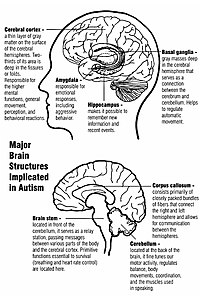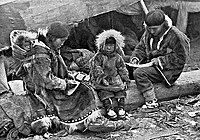
Discrimination, the Model Minority Stereotype, and Peer Relationships Across the High School Years
Sign Up to like & getrecommendations! Published in 2020 at "Journal of Youth and Adolescence"
DOI: 10.1007/s10964-020-01268-0
Abstract: Ethnic stereotyping can profoundly influence youth adjustment; however, little work has addressed how the model minority stereotype may affect adolescent social adjustment. This study examined Asian American adolescents’ peer relationships over time and how perceived… read more here.
Keywords: minority; model minority; peer relationships; minority stereotype ... See more keywords

Brief report: Patterns of prosocial behaviors in middle childhood predicting peer relations during early adolescence.
Sign Up to like & getrecommendations! Published in 2019 at "Journal of adolescence"
DOI: 10.1016/j.adolescence.2019.11.004
Abstract: INTRODUCTION Early adolescence is a developmental period in which peer victimization, bullying, relational aggression, and social exclusion are particularly prominent. As these behaviors have long-term implications for children, in this study, we investigated early variations… read more here.
Keywords: peer relationships; patterns prosocial; early adolescence; prosocial behaviors ... See more keywords

Building integrated peer relationships in preschool classrooms: The potential of buddies
Sign Up to like & getrecommendations! Published in 2021 at "Journal of Applied Developmental Psychology"
DOI: 10.1016/j.appdev.2021.101257
Abstract: Abstract We tested an easy-to-implement, theoretically-grounded Buddy Up intervention designed to help preschoolers engage with diverse peers. Using naturalistic observation procedures, independent observers coded children’s (N = 137) peer experiences in preschool classrooms. Findings revealed… read more here.
Keywords: peer relationships; integrated peer; intervention; relationships preschool ... See more keywords

Poor sleep quality is associated with discordant peer relationships among adolescents with Autism Spectrum Disorder
Sign Up to like & getrecommendations! Published in 2017 at "Research in Autism Spectrum Disorders"
DOI: 10.1016/j.rasd.2016.11.008
Abstract: Abstract Background Individuals with Autism Spectrum Disorder (ASD) experience impairments in social communication, and these deficits often make it difficult to form and maintain friendships with peers. Poor sleep quality and daytime sleepiness are common… read more here.
Keywords: poor sleep; quality; peer relationships; daytime sleepiness ... See more keywords

The Connection Project: Changing the peer environment to improve outcomes for marginalized adolescents
Sign Up to like & getrecommendations! Published in 2021 at "Development and Psychopathology"
DOI: 10.1017/s0954579419001731
Abstract: Abstract This study evaluated a school-based intervention to enhance adolescent peer relationships and improve functional outcomes, building upon Ed Zigler’s seminal contribution in recognizing the potential of academic contexts to enhance social and emotional development.… read more here.
Keywords: peer relationships; connection project; peer; project changing ... See more keywords

Longitudinal associations between early childhood irritability and adolescent depression symptoms in autistic children are mediated by peer relationships but not educational engagement.
Sign Up to like & getrecommendations! Published in 2023 at "Development and psychopathology"
DOI: 10.1017/s0954579422001316
Abstract: In the general population, irritability is associated with later depression. Despite irritability being more prevalent in autistic children, the long-term sequelae are not well explored. We tested whether irritability in early childhood predicted depression symptoms… read more here.
Keywords: autistic children; early childhood; depression; peer relationships ... See more keywords

Beyond Social Skills: Supporting Peer Relationships and Friendships for School-Aged Children with Autism Spectrum Disorder.
Sign Up to like & getrecommendations! Published in 2018 at "Seminars in speech and language"
DOI: 10.1055/s-0038-1628369
Abstract: Social impairments are the sine qua non of autism spectrum disorder (ASD). However, children with ASD are capable of forming reciprocal friendships and many people with ASD have a strong desire for friends. Developing and… read more here.
Keywords: relationships friendships; school aged; peer relationships; social skills ... See more keywords

Students’ peer relationships and their contribution to university adjustment: the need to belong in the university community
Sign Up to like & getrecommendations! Published in 2017 at "Journal of Further and Higher Education"
DOI: 10.1080/0309877x.2017.1311996
Abstract: Abstract Whilst new friendships and an active social life are commonly discussed features of ‘being a student’, there is limited empirical research that has quantitatively studied the contribution that social factors play in students’ university… read more here.
Keywords: university; university adjustment; attachment university; peer relationships ... See more keywords

Obesity and social marginalization: When do organized activities promote or hinder peer relationships?
Sign Up to like & getrecommendations! Published in 2019 at "Applied Developmental Science"
DOI: 10.1080/10888691.2017.1329013
Abstract: ABSTRACT Overweight youth are often socially marginalized and have fewer friends than their nonoverweight peers. Participation in organized activities may be one way to promote friendships for overweight youth. In this study, we used a… read more here.
Keywords: organized activities; peer relationships; obesity social; social marginalization ... See more keywords

Development of Peer Relationships From Adolescence into Emerging Adulthood: Comparing Males and Females With and Without Type 1 Diabetes.
Sign Up to like & getrecommendations! Published in 2022 at "Journal of pediatric psychology"
DOI: 10.1093/jpepsy/jsac019
Abstract: OBJECTIVE Friendships and romantic relationships are important sources of support that contribute to well-being for youth across adolescence and emerging adulthood and may be especially important for those with a chronic illness. We examined gender… read more here.
Keywords: support; peer relationships; friend support; adolescence emerging ... See more keywords

PROMIS Peer Relationships Short Form: How Well Does Self-Report Correlate With Data From Peers?
Sign Up to like & getrecommendations! Published in 2018 at "Journal of Pediatric Psychology"
DOI: 10.1093/jpepsy/jsy038
Abstract: Objective To examine the psychometric properties of the Patient-Reported Outcomes Measurement Information System (PROMIS®) peer relationships short form (PR-SF), including association with peer-reported friendships, likeability, and social reputation. Method 203 children (Mage = 10.12 years, SD = 2.37, range = 6-14) in… read more here.
Keywords: relationships short; peer relationships; short form; promis peer ... See more keywords